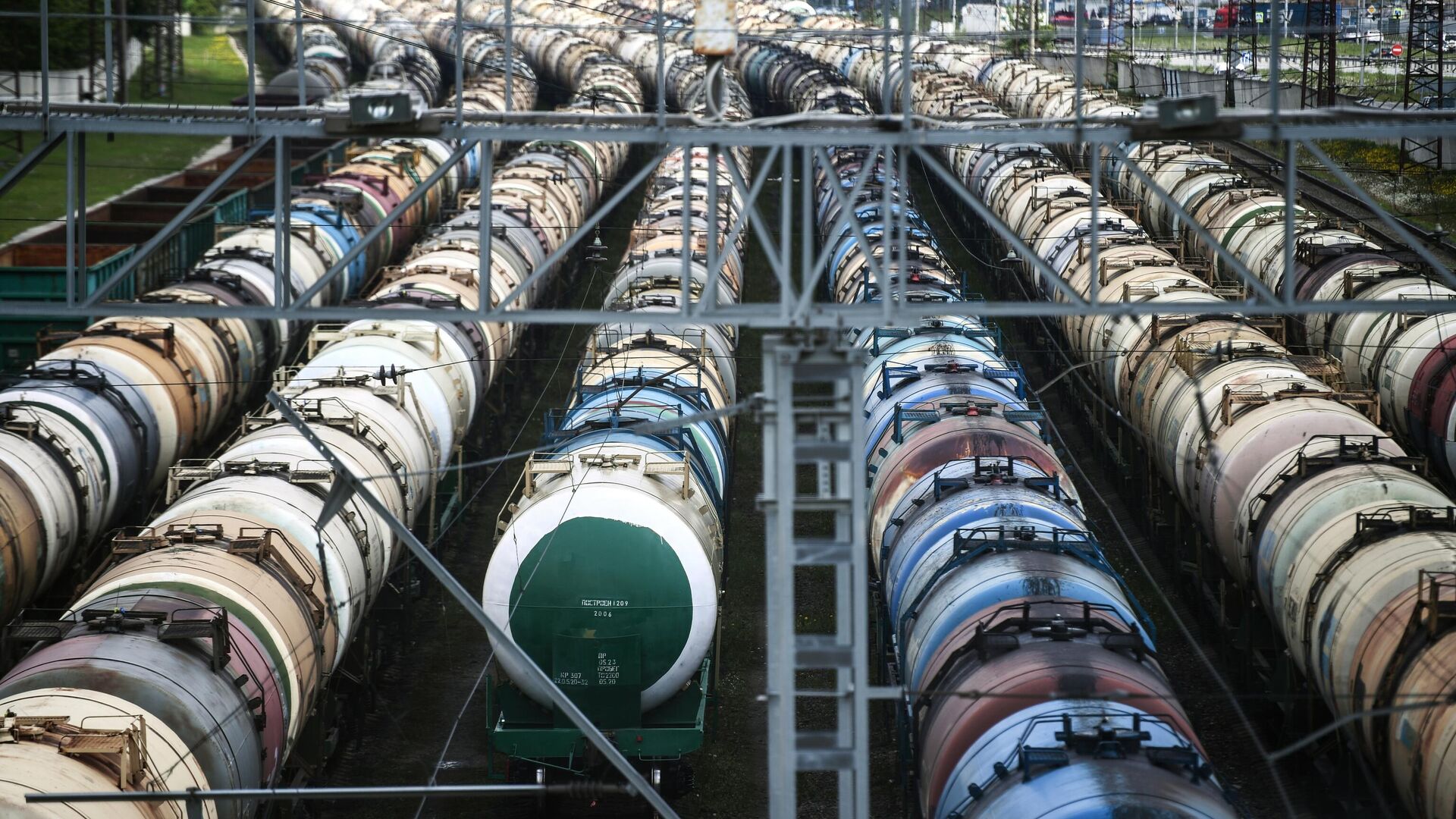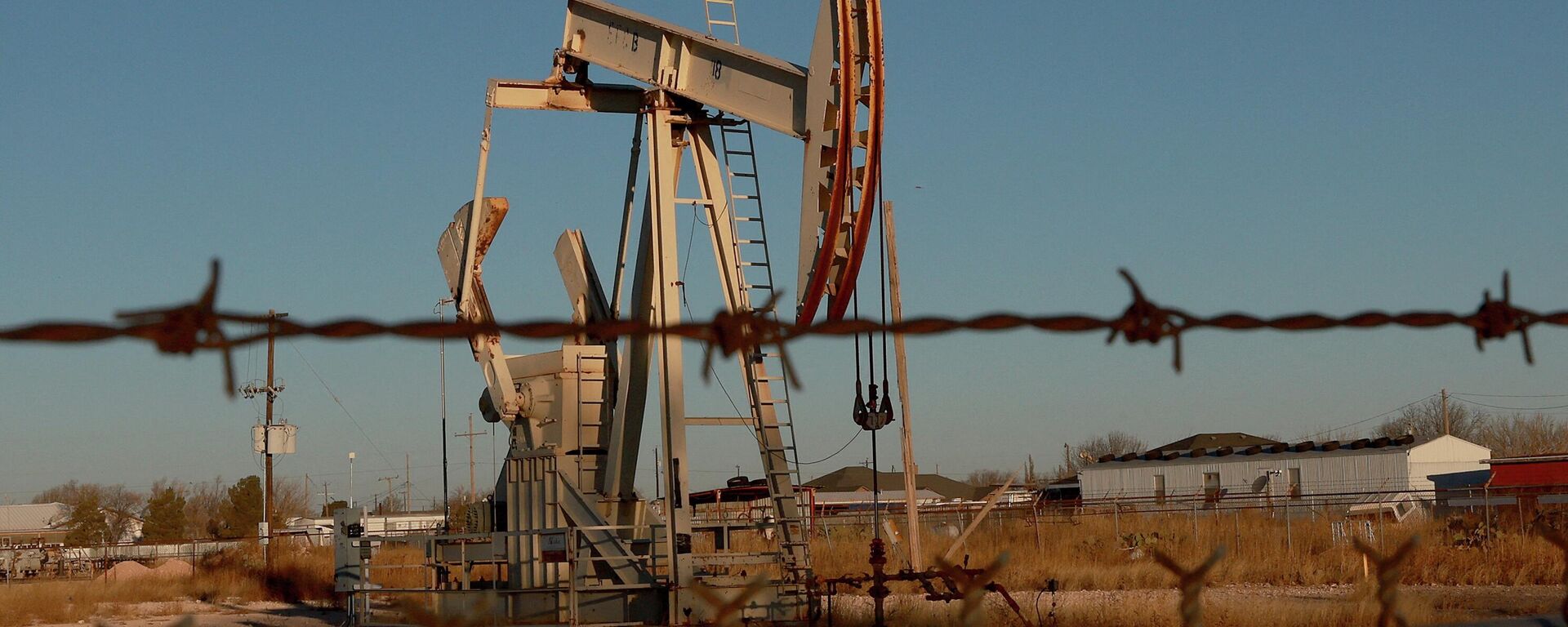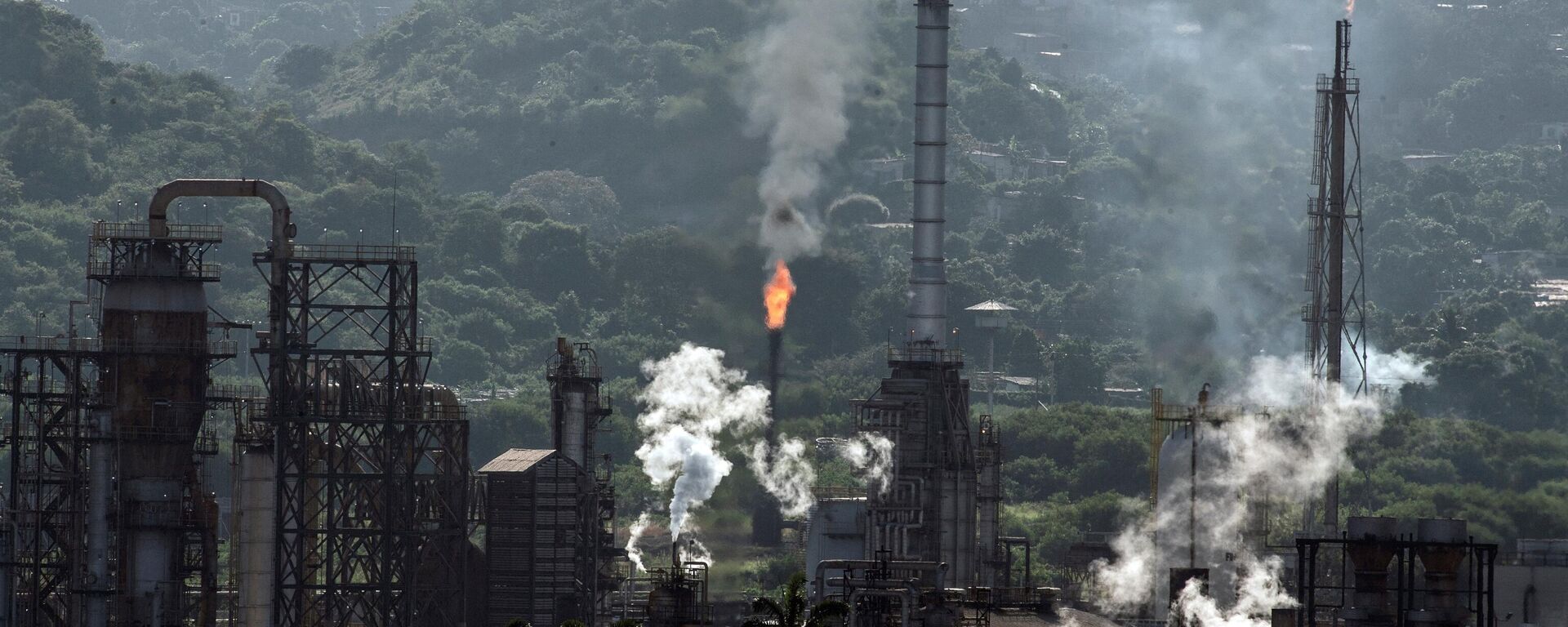https://sputnikglobe.com/20220519/russia-moves-dodge-us-sanctions-aimed-at-crippling-oil-sector-by-filling-up-prcs-reserves-report-1095639883.html
Russia Moves Dodge US Sanctions Aimed at ‘Crippling’ Oil Sector by Filling Up PRC’s Reserves: Report
Russia Moves Dodge US Sanctions Aimed at ‘Crippling’ Oil Sector by Filling Up PRC’s Reserves: Report
Sputnik International
The Biden administration banned Russian oil imports in March, and expressed confidence in April that its European allies would eventually follow suit. On... 19.05.2022, Sputnik International
2022-05-19T16:25+0000
2022-05-19T16:25+0000
2022-05-19T16:27+0000
oil
russia
america
china
https://cdn1.img.sputnikglobe.com/img/07e6/05/13/1095639853_0:160:3073:1888_1920x0_80_0_0_c49c0095839400f2cba748a190741ff2.jpg
Russia and China are engaged in negotiations on the import of Russian crude oil to fill up the People’s Republic’s strategic stockpile, Bloomberg reports, citing people said to be familiar with the matter.China does not ordinarily report on the size and contents of its strategic petroleum reserve. However, in a 2016 report, the country indicated that the reserve had a total capacity of about 500 million barrels. Late last year, the state reserve bureau announced that it would work to release crude reserves amid spiking global prices. The Asian industrial giant is dependent on crude imports for the vast majority of its consumption, mostly from the Middle East, Russia, Africa and Brazil. Russia accounted for 15.8 percent of China's oil needs in 2020.The ongoing negotiations come amid reports that the US is brainstorming ways to tighten the screws on Russia’s oil revenues, which jumped by more than 50 percent last month notwithstanding the US and UK import ban an other restrictions.Officials told the newspaper that they remain stumped on finding a balance between “starving Moscow” of revenues while preventing the inevitable skyrocketing of prices if new restrictions put in place. Russia accounts for about 10 percent of global petroleum output, exporting a total of over 1.7 billion barrels of oil in 2021. Washington’s efforts to bar Russian oil and instability associated with these measures have already resulted in historically high gasoline prices in the US and other markets.The current US strategy includes encouraging countries to ‘wean themselves off’ of Russian oil in the coming months, and enforcing the ban on the export of oil sector technologies to Russia to “cripple” its oil companies over the long haul.The US and Britain banned Russian oil in March, with the EU proposing a sixth package of sanctions, including an oil embargo, but facing problems amid Hungarian intransigence. Last week, Hungarian Prime Minister Viktor Orban warned that a cutoff of Budapest’s access to cheap Russian energy would be the equivalent of dropping an “atomic bomb” on Central European nation’s economy. German industrial leaders have expressed similar fears, saying Berlin should expect the worst economic crisis since 1945 if bans on Russian energy are introduced.The Group of Seven agreed this month to phase out Russian oil with time, with specifics expected to be hammered out at Thursday’s meeting of its finance ministers in Bonn.Since February, India and Turkey have taken advantage of deep discounts on Russian energy. South Korea and China have also continued purchases, albeit at reduced levels. Last week, Deputy Prime Minister Alexander Novak said Russian oil giants were finding new buyers, increasing exports to the Asia-Pacific region, and working to create new supply chains for Russia’s black gold.On Tuesday, Russian President Vladimir Putin said Moscow could not stop Europe from committing “economic suicide” at the behest its “American overlords,” and called on the Russian government to develop measures to take advantage of Brussel’s strategic nearsightedness.“One gets the impression that our Western colleagues, politicians and economists have simply forgotten the foundations of the elementary laws of economics, or, to their detriment, prefer to deliberately ignore them,” Putin said.
https://sputnikglobe.com/20220517/crude-down-2-first-major-drop-in-5-days-as-eu-remains-undecided-on-russia-oil-ban-1095587336.html
https://sputnikglobe.com/20220517/us-approves-resumption-of-operations-in-venezuela-for-us-european-oil-companies-1095586614.html
https://sputnikglobe.com/20220509/russian-oil-companies-find-new-buyers-increase-exports-to-asia-pacific-1095383415.html
china
Sputnik International
feedback@sputniknews.com
+74956456601
MIA „Rossiya Segodnya“
2022
News
en_EN
Sputnik International
feedback@sputniknews.com
+74956456601
MIA „Rossiya Segodnya“
Sputnik International
feedback@sputniknews.com
+74956456601
MIA „Rossiya Segodnya“
oil, america, china
Russia Moves Dodge US Sanctions Aimed at ‘Crippling’ Oil Sector by Filling Up PRC’s Reserves: Report
16:25 GMT 19.05.2022 (Updated: 16:27 GMT 19.05.2022) The Biden administration banned Russian oil imports in March, and expressed confidence in April that its European allies would eventually follow suit. On Tuesday, Vladimir Putin said an EU decision to commit “economic suicide” by banning Russian energy was the bloc’s “internal affair,” and that Russia would proceed from its own economic interests.
Russia and China are engaged in negotiations on the import of Russian crude oil to fill up the People’s Republic’s strategic stockpile, Bloomberg
reports, citing people said to be familiar with the matter.
The talks are reportedly being held at the government-to-government level, with ‘little direct involvement’ from either country’s oil companies. Volumes and terms of the proposed deal are yet to be hammered out.
China does not ordinarily report on the size and contents of its strategic petroleum reserve. However, in a 2016 report, the country indicated that the reserve had a total capacity of about 500 million barrels. Late last year, the state reserve bureau
announced that it would work to release crude reserves amid spiking global prices.
The Asian industrial giant is dependent on crude imports for the vast majority of its consumption,
mostly from the Middle East, Russia, Africa and Brazil. Russia accounted for 15.8 percent of China's oil needs in 2020.
The ongoing negotiations come amid reports that the US is brainstorming ways to tighten the screws on Russia’s oil revenues, which jumped by
more than 50 percent last month notwithstanding the US and UK import ban an other restrictions.
Current and former US officials
told the New York Times on Thursday that the Biden administration is considering a range of measures, including secondary sanctions (i.e. threats to impose restrictions on countries that do business with Russia), as well as a ‘price cap’ proposal aimed at limiting how much Russia can earn from its exports.
Officials told the newspaper that they remain stumped on finding a balance between “starving Moscow” of revenues while preventing the inevitable skyrocketing of prices if new restrictions put in place. Russia accounts for about 10 percent of global petroleum output, exporting a total of over 1.7 billion barrels of oil in 2021. Washington’s efforts to bar Russian oil and instability associated with these measures have already resulted in historically high gasoline prices in the US and other markets.
The current US strategy includes encouraging countries to ‘wean themselves off’ of Russian oil in the coming months, and enforcing the ban on the export of oil sector technologies to Russia to “cripple” its oil companies over the long haul.
The US and Britain banned Russian oil in March, with the EU proposing a sixth package of sanctions, including an oil embargo, but facing problems amid Hungarian intransigence. Last week, Hungarian Prime Minister Viktor Orban warned that a cutoff of Budapest’s access to cheap Russian energy would be the equivalent of dropping an “atomic bomb” on Central European nation’s economy. German industrial leaders have expressed similar fears, saying Berlin should expect the worst economic crisis since 1945 if bans on Russian energy are introduced.
The Group of Seven agreed this month to phase out Russian oil with time, with specifics expected to be hammered out at Thursday’s meeting of its finance ministers in Bonn.
Since February, India and Turkey have taken advantage of deep discounts on Russian energy. South Korea and China have also continued purchases, albeit at reduced levels. Last week, Deputy Prime Minister Alexander Novak said Russian oil giants were finding new buyers, increasing exports to the Asia-Pacific region, and working to create new supply chains for Russia’s black gold.
On Tuesday, Russian President Vladimir Putin
said Moscow could not stop Europe from committing “economic suicide” at the behest its “American overlords,” and called on the Russian government to develop measures to take advantage of Brussel’s strategic nearsightedness.
“One gets the impression that our Western colleagues, politicians and economists have simply forgotten the foundations of the elementary laws of economics, or, to their detriment, prefer to deliberately ignore them,” Putin said.





